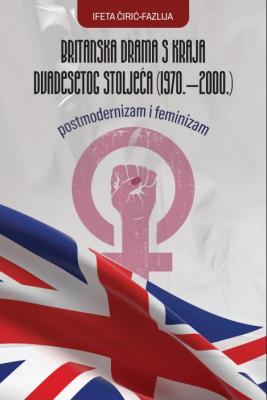Britanska drama s kraja dvadesetog stoljeća (1970.– 2000.): postmodernizam i feminizam
Keywords:
anglofona književnost i kultura, britanska drama i teatar, feminizam, postmodernizam, savremena književnost, kulturaSynopsis
Monografija Britanska drama s kraja dvadesetog stoljeća (1970.– 2000.): postmodernizam i feminizam razmatra niz tematskih jedinki, počevši od kratkog teorijskog pregleda elemenata i osobenosti književnosti dramskog roda, te društveno-historijskog konteksta odabranog perioda drame i teatra koji su u središtu analitičkog razmatranja. Nakon sagledavanja društveno-historijskih dešavanja koja su dijelom oblikovala britanski teatar i dramu u posljednje tri dekade dvadesetog stoljeća, treća tematska jedinka progovara o trendovima i žanrovima, teatarskim kućama, trupama i festivalima u britanskoj drami od 1970-ih do 2000-ih. Potom se knjiga bavi britanskom postmodern(ističk)om dramom, kroz diskusiju o značajnim karakteristikama postmoderne književnosti i drame – njenoj decentriranosti i otvorenoj formi, hibridnosti, intertekstualnosti te revalorizaciji historije kako generalno tako i u odabranim djelima Alana Ayckbourna, Toma Stopparda, Trevora Griffithsa, Liz Lochhead, Christine Reid te Caryl Churchill. Knjiga zatim nastavlja analizirati osnovne idejne postulate te formalne i strukturalne karakteristike feminističke drame u Britaniji i to najprije u suodnosu s postmodernizmom a potom i kroz diskusiju o politikama identiteta te tematiziranju spola i roda pri čemu su poslužila djela i Reidove i Churchillove i Lochhead te spisateljica Sharman Macdonald, Rone Munro i Jackie Kay. Primarni cilj ove knjige je upoznati svoje čitatelje s modusima razvoja i trendovima u britanskoj drami nekoliko decenija pred kraj dvadesetog stoljeća, iako pri samom svom kraju ulazi i u dvadeset i prvo stoljeće s tekstovima autorica Adshead, Wertenbaker i Gupte. Također je cilj ove monografije čitateljima predočiti žanrovske podvrste i osobenosti dramske književnosti i izvedbene umjetnosti s prostora Velike Britanije te im podrobnije predstaviti reprezentativna djela značajnih dramatičarki i dramatičara (koje/i su mahom nepoznati široj bosanskohercegovačkoj čitateljskoj i teatarskoj publici), kao i društvenohistorijski i kulturološki kontekst unutar kojeg su odabrani autori i autorice djelovali i djeluju i na koji nužno i reagiraju.
Downloads
References

Downloads
Published
Categories
License

This work is licensed under a Creative Commons Attribution-ShareAlike 4.0 International License.
